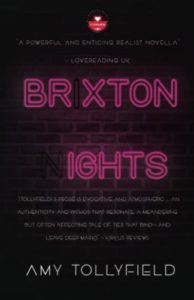In Brixton Nights by Amy Tollyfield, Christina, a thirty-something self-proclaimed butch lesbian, struggles to overcome her past trauma in this coming-of-age novella.
Christina remembers the hot summer day when she, her mother, and her brother went out to spend the afternoon at an industrial park, a rare treat from their grim apartment life. Not long after that, Christina and her brother Kyle lose their mum and are raised by Simone, a well-meaning woman of deep faith, with whom they have a complicated relationship. As the narrative weaves back and forth between childhood and the present, early 2020 in the world of the story, we learn that Christina continues to struggle with her childhood trauma and that trauma bleeds over from the past to affect her future. She engages in meaningless relationships that are depicted with heartbreaking vividness, but she remains unable to connect to others when it matters, even though she’d like to. In the past, as Christina and Kyle long for their mum, and flounder when they are unable to reach her, Christina of the present flounders in her relationships, pulled back to the past over and over.
Set in the cities of Hull and Brixton in England, the descriptions of each are sharp, as are the descriptions of those who populate it. Christina’s life is split, between practiced indifference and an overwhelming longing to connect, between her present life and the industrial park where she once spent the afternoon with her mother and brother. Her longing to go back to those simpler times, before everything became broken, is palpable, even as she refuses to look back and only focuses on the girl in front of her.
This is a story of deep trauma, delving bravely into Chris’ painful journey. It’s a strongly told story, with a narrator who shares keen observations about the world. It captures the party and casual hookup scene incredibly well, including the longing and disappointment it often brings. The ending is very literary and may leave a reader pondering what the protagonist is trying to impart, whether anything has actually changed for her, and, if so, what that change might be. The story also tends to meander, much like the bad television that Christina enjoys, and it can feel like one big therapy session until the narrator pops out another sharp and surprising observation or image. Christina shares that loose ends are not always tied up, women are enigmas, and there are prisons in our minds that we make for ourselves, and those we inherit.


